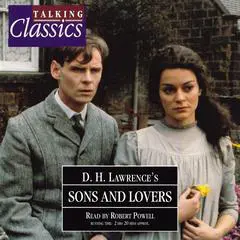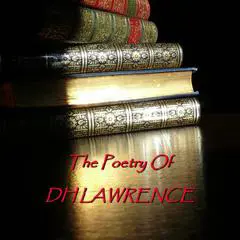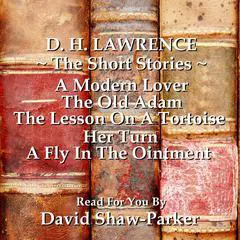 Play Audiobook Sample
Play Audiobook Sample
Women in Love (Abridged) Audiobook
 Play Audiobook Sample
Play Audiobook Sample
Quick Stats About this Audiobook
Total Audiobook Chapters:
Longest Chapter Length:
Shortest Chapter Length:
Average Chapter Length:
Audiobooks by this Author:
Publisher Description
Women in Love begins one blossoming spring day in England and ends with a terrible catastrophe in the snow of the Alps. Ursula and Gudrun are very different sisters who become entangled with two friends, Rupert and Gerald, who live in their hometown.
The bonds between the couples quickly become intense and passionate, but whether this passion is creative or destructive is unclear. In this astonishing novel, widely considered to be D. H. Lawrence's best work, he explores what it means to be human in an age of conflict and confusion.
Download and start listening now!
"WOMEN IN LOVE made a man out of me. I mean that in a metaphorical, literary sense. Like saying that some harsh cup of coffee might "put hair on your chest." That's what I mean. WOMEN IN LOVE is a hella big mug of ultra-harsh sensual coffee. Dip me in again, D.H."
— Kevin (4 out of 5 stars)
Quotes
-
“What beauties the book contains! There are many pages in it so saturated with warm and lovely intimacies that one reads absorbed.”
— Guardian (London)
Women in Love Listener Reviews
-
" The edition I read had some critical commentary in the frontmatter. In one case, someone or other was quoted as having said this book should have been called "Everyone In Hate". That's only the beginning of the story: everyone is completely, irrationally hateful, spiteful, and petty at times, especially the women -- including the painfully incomprehensible act of attempted murder with a paperweight over a shockingly mild disagreement about the meaning of a probably meaningless painting of a duck, compounded by the victim's later conclusion that he deserved the unprovoked attack, which in a better writer's work might have been attributed to the severe concussion he received. Meanwhile, the attention on the manly physiques of the heroic male characters was absurd in its poorly suppressed and utterly gratuitous lasciviousness, while the fatuous, excrutiating attention to irrelevant details (such as the comically out of place page and a half devoted to the yellow dress worn by one of the key female characters in the midst of what could have been a tragic incident involving a boy's untimely demise) boggled the mind. One could easily be forgiven for coming away from this book with the idea that its author was a misogynistic, cowardly, loathesomely passive-aggressive man who lashed out at everyone who did not regard him with stars in their eyes through the pathetic mechanism of turning them into comically vile people in his writing, his view of the world twisted by his inability to reconcile his latent (but obviously emerging) homesexuality with his cultural indoctrination. In fact, if one was to then go on to read about Lawrence's life at the time he wrote the book, one's ideas to that effect would be fully justified. The asinine double-helping of teenage angst behind Lawrence's piss-poor writing might be forgivable if he was not about twice the age normal for that kind of self-pitying pathos. I'm convinced the only reason this overwrought, overvalued, overlong bundle of kindling is regarded as a "classic" is its controversy at the time it was published and the fact it is a relatively early indicator of the way repressed sexual deviations from the norms of the time found outlet in what we might call "the arts" for lack of a better, less flattering term for this novel. "
— Chad, 2/14/2014 -
" Ok, definitely NOT in the caliber of Lady Chatterley's Lover, I thought the characters, sisters Gudrun & Ursula, annoying as heck. They were seriously wishy washy, not really knowing WHAT they wanted, & the story just didn't "flow" for me. Hoping Sons & Lovers will be better! "
— Lisa, 2/4/2014 -
" one of my all-time faves. "
— Charlotte, 2/1/2014 -
" One of a very few books I struggled to get through. "
— Kristen, 1/8/2014 -
" I had to read this for my 20th century lit class. I just couldn't get into the story or the characters at all. I never finished it because I could get away with never finishing it. I don't think I even made it half way through. It is possible that I would have liked it I had read more of or if I had more support from my professor or if I wasn't reading so many other books at the time. "
— jacky, 1/6/2014 -
" Love D.H. Lawerence. Sometimes it seems I am the only person that does. "
— Lydia, 1/1/2014 -
" I love this book and keep coming back to DH Lawrence again and again. "
— Bethany, 12/30/2013 -
" Not memorable for me. But I know I really liked everything I ever read by DH Lawrence. "
— Deb, 12/20/2013 -
" The only thing I hate more than Return of the Native and Sons and Lovers is this book. Chthonic in the most horrifying sense. Traumatic and awful. As many have quipped, "It should be called Men in Love." Read Kate Millet's book on Lawrence instead. "
— Christin, 12/14/2013 -
" Just ordered this book from an online bookseller, exteremly excited, have been saving it for this winter. "
— Talkingtowalls, 9/29/2013 -
" After about 150 pages, I can't bring myself to finish this, which will probably have me thrown out of all literary circles I might have a chance to come close to. The women and the relationships are just ridiculous. "
— Susan, 9/29/2013
About D. H. Lawrence
D. H. Lawrence (1885–1930) was a British writer of novels, poems, essays, short stories, and plays. Some of the books he wrote in the early 1900s became controversial because they contained direct descriptions of sexual relations. His best-known books are Sons and Lovers, The Rainbow, Women in Love, and Lady Chatterley’s Lover.
About Bob Peck
Bob Peck (1945-1999) was an award-winning British actor with the National Theater and Royal Shakespeare Company, performing in Nicolas Nickleby, Macbeth, and Othello, among other productions. On television, he appeared in many successful series including Z-Cars, Play for Today, and Edge of Darkness, for which he won a British Academy Television Award for best actor and is perhaps best-known. After gaining popularity as a television actor, Peck went on to appear in numerous films and was cast in his biggest film as park gamekeeper Robert Muldoon in Jurassic Park. He died of cancer at his home in London in 1999, survived by his wife and three children.






















